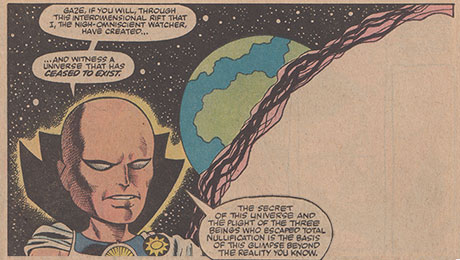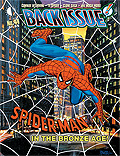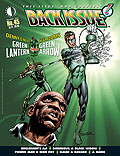Karen: Continuing the theme of Buried Treasures this week, I came across these four paperbacks a couple of weeks ago while looking for another book entirely in one of the plastic bins full of books in my garage. I had honestly thought I had donated my Star Trek novelizations years ago, so I was delighted to find these James Blish books were still in my collection.
Karen: Blish wrote the adaptations for the episode of the original series. Twelve books were produced, and each book contained several episodes, typically half a dozen or so. Initially he often worked from the early drafts of scripts, and so sometimes the stories in the books were slightly different than the episodes broadcast. When the Trek production crew discovered that the adaptions in the books were not mirroring the final episodes, they were annoyed, to put it mildly. Marc Cushman describes what happened in his book, These Are The Voyages Volume Two. It was actually Leonard Nimoy who first heard about the problem, when a fan wrote him and complained about how Spock was portrayed in the first novelization, as well as discrepancies in the adaptation of "The Naked Time." Nimoy went to Roddenberry with it. After the second book came out, D.C. Fontana was upset that Blish had left out the central point of her script for "Tomorrow is Yesterday," that Captain Christopher had to be returned to Earth because of his unborn son. She also found fault with his handling of "Court Martial" and "Operation:Annihilate!". Roddenberry wrote an executive at Desilu (Star Trek's production studio) and he contacted Blish's editors at Bantam books. All of the complaints were sent off to the author, along with a writer's guide for the series. Later books appeared to cleave more closely to the finished episodes.
Karen: Of course I knew nothing about this as a kid. Back in the mid-70s, I was just happy for any Trek product I could get my hands on. Although I only purchased four of these books, I read all of them through our public library. It was a way to relive the episodes, back in those days before DVDs and the internet.
Karen: I thumbed through the books, and actually read "Space Seed" from book 2. I can see why the Trek production crew were frustrated with the adaptations. In "Space Seed," Blish completely leaves out McCoy's encounter with Khan in sickbay, the scenes establishing Khan and McGiver's relationship are also left out, and the physical confrontation between Kirk and Khan at the end is summarized in a single sentence! He also spells Khan "Kahn" throughout. To be sure, the stories are less than perfect. But they have a certain nostalgic value. I think however it has lessened since we have easy access to the actual episodes now.
Karen: Any thoughts or memories about these adaptations?





















































17 comments:
Between us, I and my sister had virtually all of them, although the copies we had possessed dramatically different covers from the ones above. Our versions featured a great big number on the front, with the main cast's heads above it and the Enterprise beneath it. I always liked the books because the stories were short, which, when I was nine, seemed a very good thing indeed.
My favourite was Star Trek 7, because I liked the colour of the big 7 on the cover. As you can tell, I was a discerning reader at that age.
I was very excited when I found the first four books in the series at a used book sale a couple of years ago - bought all four for two dollars. Having watched the TV episodes numerous times the discrepancies do jump out at you. In the latter books Blish added intros and original script writing credits to each story. One interesting point - when Blish adapted City On The Edge of Forever he blended elements from both Harlan Ellison's original treatment along with the filmed teleplay to create yet another version.
Kevin
Read them. Sometimes the Blish adaptation was slightly juicier and more poignant than what eventually ended up on screen. In his adaptation of the second season encounter with Apollo, for instance, the young lieutenant was determined pregnant after her dalliances with the sun god. I can see why that didn't make it into 1960s television, but it is an intriguing thing to dangle at the end of a story.
I really like the covers to numbers 7 and 8 in particular - I'd probably pick either of those up if I ever came across them somewhere. As it is, and as I think I've mentioned before, I've read all of one Star Trek prose book (1968's Mission to Horatius). But I am interested in some of these, especially since I like Blish's other SF writings, and some of the Trek novels by a few other authors (mainly Diane Duane and Vonda McIntyre).
I have some of these and the quality of the stories seems to vary quite a bit; but I think I actually read a couple of these (#5 and #10 maybe?) before I actually saw some of the episodes represented in the stories. So there are certain episodes (The Galileo 7, Requiem for Methuselah, Whom Gods Destroy) I have a higher opinion of because I liked the adaptations.
I agree wholeheartedly with Edo about Diane Duane...great writer. Another of my favourite Trek novel writers was A.C. Crispin, who wrote a couple of great follow-ups to the "All Our Yesterdays" episode. She also wrote a Star Wars trilogy about the pre-New Hope Han Solo that was never considered canon, but definitely should've been. I'm hoping they use some of the elements from her trilogy in the new Han Solo movie, but they probably won't.
Mike Wilson
I never read any of the Blish adaptions but according to a Trek magazine article he also added elements from his own stories. References include events from Cities in Flight and Galactic Cluster among other stories. This led the author to conclude that the Blish adaptions took place in alternate universes. This was the subject of the article.
These were great purchases circa 1973/1974.., I especially loved the covers for 5,6 and 10. They seem to really, REALLY embrace the uber-cool cosmic nature behind Star Trek's fantastic (for 1966..) concept.
The interesting thing about the cover on 10, was the Klingon D-7 looked like it was 'icy' in a way. I had just purchased the ATM Klingon model and it was molded in black. Not white or gray like I've seen the Enterprise, but JET-BLACK. It was awesome to display, but obviously the water-slide Klingon decals wouldn't show up at all. A mixed blessing.
On a side note, I loved the evil look of the black ship so much that when I bought the later AMT 'trio' set, I of course had to paint my D-7 flat black with some silver highlights. I still have it somewhere packed away.
I know they updated the covers in some future re-release, but these original covers were the best in my young heart.
Anyone read the 'Spock Must Die' Blish original..? I should wiki that to see what the backstory on that is.
First off, I (somehow) enjoyed it as a kid, but it seemed very challenging to reread it a few years back. The characterizations were off there as well (like the adaptations), and McCoy was always referred to as 'Doc', not 'Bones'. So there were a few off-putting literary licensing used, but all in all it's remains a challenging read.
Hiya,
If there is one great consistency to the artistic universe it is that NO ONE is ever happy with the adaptation of their work for another medium . . . unless you are Vladimir Nabokov and have just seen Stanley Kubrick's Lolita.
Seeya,
pfgavigan
I enjoyed Spock Must Die!, although what Blish did at the end to a certain ongoing threat was quite rightly ignored forever after. I remember him writing somewhere that his manuscript had Kirk calling McCoy "Bones" and not "Doc," but some copy editor decided to fix that for him.
I could swear that the adaptation of "Tomorrow is Yesterday" did include the part about Captain Christopher's son. What it omitted was the whole subplot where Kirk is captured by the Air Force men and the security guard is accidentally beamed up to the Enterprise. As noted in the article, the adaptations got truer to the aired episodes in the later books, but somehow I found the earlier ones livelier.
I bought my first of these at a book fair held over the summer at the elementary school (grades 4-5) next to my house. I think I was going into fifth grade at the time. I bought maybe two of the story collections plus Spock Must Die! I've never forgotten the concept introduced in Spock Must Die!, that the transporter kills you and makes a copy. And the story felt very different than the TV show—colder, like the animated series. In fact, all the short stories (of which I read many) felt that way.
I got rid of all those books many years ago (they likely were fallinga apart), but I bought one of the story collections at a used book sale last winter. The stories certainly vary widely in quality, sometimes rushing through important matters and at other times lingering thoughtfully. As I said above, they don't really feel like the TV show, at least, not the ones I recently reread, but they're fun, and I like that they differ from the final episodes, as it lets you see the process by which the scripts became, typically, better by the time they reached the screen.
I was first introduced to these novelizations by James Blish when I began junior high, in 1991, when the episode adaptations were collected in three 25th anniversary volumes. Season One was a purple book, Season Two was a red book, and Season 3 was a blue book, and I still have them on my bookshelf today. I recall reading and rereading them countless times, and enjoying them immensely. Sometimes writer James Blish did describe a major incident in just a small paragraph, or even just a sentence, but having access only to television scripts, I cannot entirely blame him for occasionally adding emphasis to certain parts and lesser emphasis to others. About ten years ago I collected all twelve original novelizations from the late 60s and early 70s. I'm also a fan of Blish's "Spock Must Die!" novel, which was a very clever and in my opinion intellectual piece of work.
For the record: These aren't "novelizations," since they aren't novels. They're adaptations.
I'd forgotten: I had one of the books adapting some of the animated episodes as well. Man. Wish I had that. (I just recently reread "The Soft Weapon," the Larry Niven short story that was adapted and Trekified for one of the animated eps.)
I've also collected the adaptations of the Animated Series, written by Alan Dean Foster, (Log One, Log Two, etc.) who is no stranger to science fiction himself. Well-written and engaging.
Pfgavigan made an excellent point; few creators of artistic works, be they scripts, books, or plays, are satisfied with the conversion of their works to television or film, or vice versa. Authors--especially of lengthy written books--must resign themselves to the fact that only about 10-15% of their work will make its way into a movie, and even if the authors themselves are an integral part of the process, are subject to having their work altered by another party. The pitfalls of showbiz.
Nice to see these books are fondly remembered. I finished reading the "City on the Edge of Forever" adaptation and saw how Blish incorporated elements of both Ellison's original story and the finished episode. Still, interesting how much was excised -basically all of Dr. McCoy's scenes on the past Earth.
I've only read a handful of Star Trek original novels. Only one stands out to me -"The Final Reflection" by John Ford. I've flipped through many others and my gut reaction was that the writing quality was uneven, to say the least. But I'm sure there are some winners. Now I'm curious about "Spock Must Die!" I may have to see if I can find it.
Rusty, thanks for that note on the 'Bones' omission. And William, there's been a few internet pieces written of late about how the Transporter in-all-actuality really does kill you. Yes, it reassembles the pieces elsewhere, but the idea goes into essentially killing your 'soul' and other metaphysical issues. Quite interesting.
Here's one popular video covering it. "A silent holocaust...", he calls it.
https://www.youtube.com/watch?v=nQHBAdShgYI
I rember Spock Must Die as one of the first books I read. The adaptations were what got me into reading books in the first place. I wish they were available in Kindle format. Sadly they are out of print. I have been reading the current crop of new Trek novels but the quality varies. Some are much better than others. My current favorite Trek authors are David Mack, Greg Cox, and John Jackson Miller. They have the voices of the characters down pat and consistently write good stories.
Post a Comment